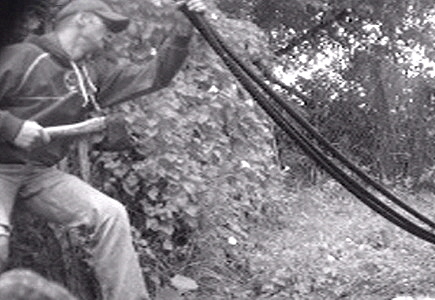
UK railway cable thefts slashed!
Friday, January 10 2014Cable thief caught in the act by Network Rail CCTV.
Joint action by Network Rail and the government has dramatically reduced cable theft on Britain’s railways. There were 285 incidents and 2,700 hours of train delays in the 12 months to April 2013, compared with 845 incidents and 5,740 hours of delays in the previous year. The cost to Network Rail, which includes compensation payments to train operating companies, fell from £18.3m to £12.7m. A year earlier, Network Rail suffered more than 1,000 thefts and 6,000 hours of delays.
Action taken by Network Rail included the more effective deployment of British Transport police, installation of CCTV at the worst trouble spots, and working with suppliers to make the cables, harder to steal and easier to identify.
Railway cable theft is part of wider problem which includes thieves stealing telecommunications cables, the lead from church roofs, metal sculptures and even metal tablets from cemeteries. The Association of British Insurers (ABI) stated that during 2012 its members were paying out more than £1m a week to victims. The Association said UK metal theft had doubled in the previous five years to about 1,000 reported incidents a week and the Police service estimated the damage to the UK economy to be around £770m a year.
Government action involved providing £5m funding for a Metal Theft Taskforce (led by British Transport Police), and introducing preliminary legislation in December 2012 giving police new powers of entry to metal yards.
The case for further legislation was strongly pursued by Network Rail, British Telecom and The Church of England. This lead directly to the Scrap Metal Dealers Act which received Royal Assent in February 2013. Its main provisions, which came into full force towards the end of 2013, gave local authorities new powers to inspect and licence scrap metal yards, obliged dealers to record all scrap metal transactions, and introduced major penalties for non-compliance.
Posted in Network Rail, police | Tagged railway cable theft, scrap metal theft |


Leave a comment